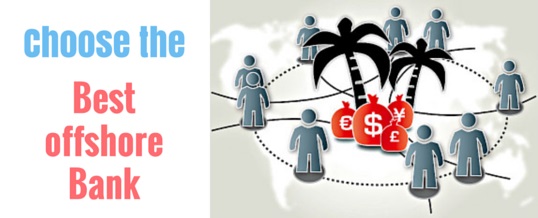
Considering the uncertainty in the current economic and political climate of your home country, you have decided to secure your wealth offshore, starting by opening an offshore bank account. You think that it's the way to go spreading the risk and diversifying your asset protection.
You next step would be in deciding which offshore bank should you open your account with. This is not an easy decision to make, as you need to consider a few things that will help you in narrowing down your option.
But fear not, we are here to help you clear the mist and show you the road ahead: Here are 5 criteria you should consider for choosing the best offshore bank for you and your assets.
1. The economic and political stability of the offshore jurisdiction
It's only logical to protect your wealth in a jurisdiction that is (much) more stable than your home country. With that said, you still need to observe the economic power and political risks.
Liechtenstein, for example, is a fundamentally-sound offshore jurisdiction when it comes to economic 'power'. The country features the highest GDP per capita in the world and has the world's lowest external debt. Liechtenstein also features stable political climate, making it into one of the well-sought-after jurisdiction for your bank account.
2. The requirements and 'features' of the offshore jurisdiction
In choosing a jurisdiction, you should consider your strategy: Do you require secrecy and privacy? Do you want to establish a personal or business accounts? Do you want online banking service? How much of minimum initial deposit do you expect? The right jurisdiction for you depends on your answer to the questions.
Puerto Rico, for example, is one of the most private and secure jurisdiction when it comes to do business and protect assets. It has established policy when it comes to banking secrecy. Opening an account can be done for as little as USD 500, and you can have an account backed by gold and silver.
3. The bank's reputation
Questionable banks pose higher risks than the well-reputed banks. Although you need to look deeper at what are the banks will be doing with your money to make sure, the bank's reputation is sufficient in giving you an idea or two about the safety of your assets when secured and/or managed by the bank of your choice.
For example, opening an account with German-based bank, KfW the safest bank in the world in 2014 according to Global Finance is considered as more secure than opening one with a bank in, say, a bank in Switzerland due to the global spotlight on the country's offshore industry.
4. The liquidity and capitalization of the bank
Try finding out more about the practices of a particular bank in your chosen jurisdiction: What are the bank's investment policies? How's the liquidity of the customers' - and your assets? How financially-sound is the bank?
In short, always look for banks with less liquidity issue and less risk for insolvency.
5. Ties with your home country
This criterion's importance is underrated. When your offshore bank has a 'tie' – or presence – in your home country, you pose yourself a similar political risk as the onshore accounts – e.g. Inaccessible or 'freezed' bank account in Cyprus and Ukraine.
How risky a tie with your home jurisdiction would be? Here's a good example for you: HSBC. The bank offers offshore banking services, but due to the leaks not long ago, the bank has proven that a presence in both onshore and offshore is often not a good idea for some of us.
Takeaway
There you go – 5 criteria for choosing the right offshore banking for you. Of course, there are more criteria that can help you choose better, but those five is sufficient for you to get started.
If you want to know more about offshore banking, consult with our team – free of charge.
APR
2015

Table of Contents